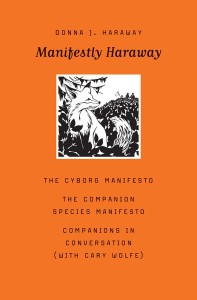DISCUSSIONI / Helah Milroy e Ziggy O’Reilly /

Manifestly Haraway is a timely addition to Donna Haraway’s Cyborg Manifesto and Companion Species Manifesto. Alongside the inclusion of these two manifestos, Manifestly Haraway has the extra addition of Companions in Conversation, which captures a conversation between Cary Wolfe and Haraway during the conference The Anthropocene: Arts of Living on a Damaged Planet. It is a conversation which discusses and clarifies the progression of Haraway’s thought surrounding the Cyborg Manifesto, the Companion Species Manifesto, and her latest book Staying with the Trouble: Making Kin in the Age of the Chthulucene. The Cyborg Manifesto was a controversial piece published by the Berkeley Social Review Collective in 1985, during the early Reagan-Thatcher era which saw a decline of leftist politics. Through the ironic and contradictory figure of the Cyborg, Haraway created a political myth which served as a critique of socialist and Marxist feminism, alongside Capitalist hegemony.
The Companion Species Manifesto was written nearly fifteen years later, and was published in 2003 when the discipline of Critical Animal Studies was still in infancy. This manifesto’s focus on shared histories and companion species with the figure of the Dog makes Haraway a significant contributor to Critical Animal Studies. The personalised tone of Companion Species Manifesto allows Haraway to discuss her nuanced biopolitics and encourage shared vitality through the accommodation of an attitude of play in engagement with significant others. Companions in Conversation re-opens the «time capsules» (p. 250) of the Cyborg Manifesto and Companion Species Manifesto in order to expose and clarify the implications of these two manifestos with regards to present political and biopolitical frameworks. Furthermore, Companions in Conversation introduces Staying with the Trouble as a new narrative through which we can think and act with collective agency in the future.
The following is a discursive review which took place over the Christmas break and into the new year of 2017 by two Biological Arts Masters students from Symbiotica, at the University of Western Australia: Ziggy O’Reilly and Helah Milroy. Both students possess highly divergent worldviews. Ziggy O’Reilly is a Psychology graduate and believer in techno-science and human-tech ingenuity, while Helah Milroy is a Philosophy graduate with Indigenous heritage, who holds a belief in the power of non-violence and has recently been baptised a Christian. This review focuses on the often-overlooked theological aspect of Haraway’s work, the formation and clarification of Haraway’s biopolitical position, and its affirmation of the necessity of adopting a narrative that facilitates both Living and Dying well together in the face of potential global environmental catastrophe.

